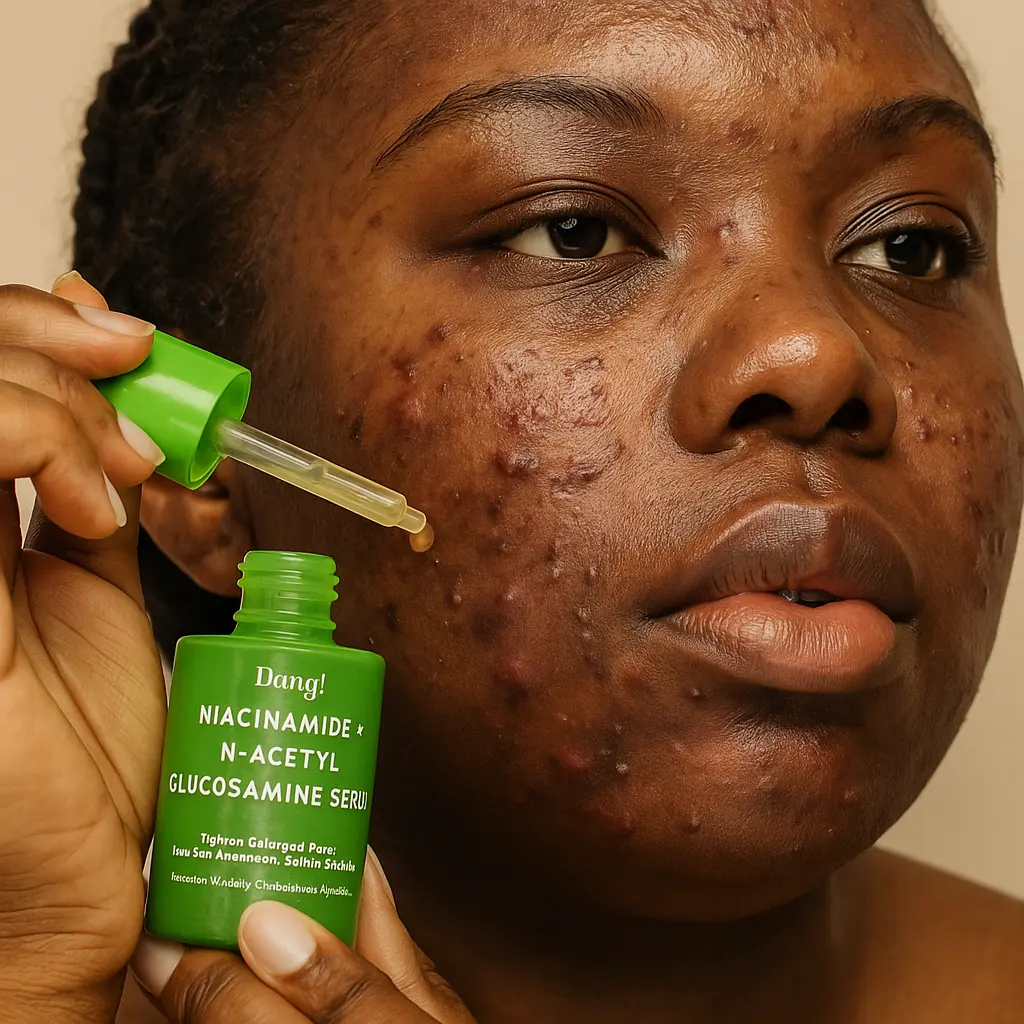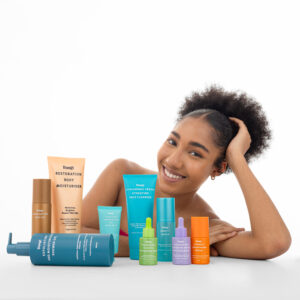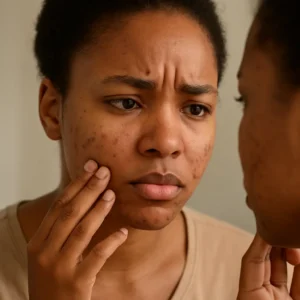
Free Shipping on Orders Over N200,0000 within Lagos
Buy 300k and get 20% off any spa service
Free Shipping For Orders over $150
Free Shipping For Orders over £100

Finding the best ingredients proven to deliver results for acne-prone skin can be overwhelming. The key to handling acne-prone skin, especially for melanin-rich skin in humid environments, is focusing on the right ingredients, not just any trend.
So, let’s explore the top science-backed ingredients and products to clear acne breakouts and fade dark spots while keeping your skin barrier intact.
The best ingredients for acne-prone skin are those that control oil production, calm inflammation, fight acne-causing bacteria, and prevent dark spots without damaging the skin barrier. Niacinamide, mandelic acid, azelaic acid, benzoyl peroxide, hyaluronic acid, vitamin C, and ceramides are all proven to deliver results.
These science-backed ingredients work together to rebalance the skin, clear breakouts, and support healthy, glowing skin, especially for melanin-rich skin in humid environments.
Acne isn’t just about stopping breakouts. It’s about regulating oil, calming inflammation, and preventing post-acne marks, especially in hot, humid climates where your skin is prone to producing more oil.
The right ingredients will deliver effective results. So, it’s time to skip the guesswork and use the right products that deliver clearer and more radiant skin, just like many users have exeperienced using Dang! lifestyle products.
This is one of the best ingredients to include in your skincare routine for acne-prone skin.
What it does: Controls sebum, calms inflammation, fades dark spots, and strengthens the skin barrier.
This clinical study showed that 4% topical niacinamide is a safe and effective treatment for mild to moderate acne.
How to use: Apply a serum or moisturizer containing 4–10% niacinamide. Start with once a week if you’ve got sensitive skin.
To use this ingredient, use the Niacinamide+N-Acetyl Glucosamine Serum.
This is a gentle and effective exfoliating ingredient for acne-prone skin.
Benefits: Penetrates the pores to dissolve oil and dead skin cells clogging the pores, as a result calming breakouts and blackheads. It also helps fade dark spots.
How to use: Use a mandelic acid cleanser or serum 2 – 3 times weekly at night. Follow with a hydrating moisturizer and always apply SPF 50 the next morning.
Get the 3-in-1 Mandelic Acid Foaming Face Wash.
This is one of the essentials for acne-prone skin.
What it does: Targets acne-causing bacteria, reduces inflammation, and gently fades post-inflammatory hyperpigmentation (PIH).
According to this study, azelacic acid is an effective ingredient for treating acne because it targets the sebum-producing follicles and inflammation.
How to use: Use a 10–15% azelaic acid serum at night, followed by a moisturizer to soothe and repair.
Explore this 10% Azelaic Acid Serum.
Personally, I like Benzoyl Peroxide for how fast and effectively it dries out acne breakouts.
What it does: Kills cutibacterium acnes to reduce inflammatory breakouts.
Using this skincare ingredient with niacinamide reduces irritation and boosts effectiveness.
How to use: Use as a spot treatment only, preferably at night, and pair with moisturizer.
Get this 5% Benzoyl Peroxide Gel.
This is also an essential ingredient for acne-prone skin. Why? It’s necessary to keep your skin moisturised as dehydrated skin can trigger more oil production and worsen acne.
What it does: Keeps the skin moisturized and strengthens the skin barrier.
How to use: Use a hyaluronic acid-infused product in your AM routine.
Explore the Hydra Glow Sun Protection Gel SPF 50 PA +++ (100% Transparent Sun Gel)
This is a multi-tasking ingredient for acne-prone skin.
Benefits: Fights free radicals, brightens dark spots, and pairs beautifully with SPF for daytime protection.
How to use: Use a stable oil-free vitamin C serum in the morning, followed by a broad-spectrum SPF 50.
Get the Vitamin C concentrated (oil-free) serum.
These are the skin barrier protectors.
What they do: Lock in moisture, repair the skin barrier, and maintain hydration without greasiness.
How to use: Use a moisturizer rich in ceramides both morning and night.
Having the right ingredients for acne-prone skin is only half the battle. Using them the right way is what guarantees results. So, here’s the recommended skincare routine for acne-prone skin.
Get the Ceramides Buffet Day Cream.
This step is essential to remove dirt and oil, laying a clean foundation for the rest of the steps in your routine.
Expert Recommendation: Use a sulfate-free gel or foaming face cleanser that eliminates dirt and oil without drying out your skin.
Hydration is key to balancing oil (sebum) production. It may seem counterintuitive, but trust me, you don’t want your skin all dried up when dealing with acne breakouts.
When your skin is dry, it can compensate by producing excess oil, which clogs pores and worsens acne breakouts.
Expert Recommendation: Use a non-alcoholic toner with the recommended ingredients for acne-prone skin, like niacinamide, green tea extract, aloe vera extract, or hyaluronic acid.
Serums are skincare actives with concentrated ingredients, formulated to target specific skin concerns like acne, wrinkles, and hyperpigmentation, and more.
Expert Recommendation: In your morning routine, you can use serums with antioxidant properties like vitamin C that protect your skin from free radicals in the environment and brighten your skin.
Contrary to what you may be thinking, even if you have oily skin, you still need to moisturise.
Expert Recommendation: Use a light-weight and oil-free moisturiser rich in ceramides or glycerin. This will keep your skin moisturised and promote your skin barrier without making your skin greasy.
“Sunscreen! It is religion, every single day. If you’re outside for more than an hour, you need to wear SPF 50 and reapply every two hours.” — Dr. Michelle Henry, dermatologist specializing in skin of color.
This is more than just skincare advice to get you to buy a product. Sunscreen is important to protect your skin from the harmful effects of UV rays in the atmosphere, especially if you spend a lot of time outdoors.
This is especially important as prolonged sun exposure has been linked to skin cancer, as stated in this research.
Expert Recommendation: Use gel sunscreen or mineral sunscreen that leaves no white cast with SPF 50 for effective protection. Also, wear protective clothing like hats, sunglasses, long-sleeved clothes, etc., for all-around protection. Finally, if you’re swimming, you may need to reapply more often than every 2 hours.
Double cleansing is so important to get rid of all the dirt, sunscreen, and makeup you’ve had all day.
Expert Recommendation: Use a non-stripping foaming face wash or cream-based cleanser to wash your face. Wash once to get rid of sunscreen and makeup. Wash the second time to get rid of any residue.
This process helps get rid of dead skin cells that clog your pores and lead to more breakouts.
Expert Recommendation: Chemical exfoliation with exfoliants like mandelic acid or salicylic acid can help you safely exfoliate without putting you at risk of irritation. Only exfoliate 2-3 times weekly to prevent over-exfoliation.
A skincare routine for acne-prone skin won’t be complete without targeted treatment serums that target acne-causing bacteria and hyperpigmentation.
Expert Recommendation: Incorporate actives like Azelaic acid (for acne treatment) and niacinamide for minimizing oil control and improving skin texture. Also, include Benzoyl Peroxide as a spot treatment if you’re battling severe acne breakouts. Apply Benzoyl on breakout spots only.
Apply moisturiser to lock in all the benefits of your skincare products and rejuvenate your skin while you sleep.
Expert Recommendation: Use a light-weight moisturiser with barrier repair ingredients like ceramides or brightening ingredients like tranexamic acid.
Acne-prone skin deserves more than guesswork. It deserves ingredients that are proven to work. Your focus should be on niacinamide, salicylic acid, azelaic acid, and quality moisturizers and SPF. These powerhouse ingredients work together to calm breakouts, clear pores, and fade dark spots, without stripping your skin or triggering irritation.
Explore our expert-curated skincare products for acne to shop these essentials or speak with our esthetician for personalized guidance today.
Serums containing Niacinamide and azelaic acid are good for acne-prone skin. Niacinamide helps reduce acne breakouts by controlling oil production. Azelaic acid also helps control acne by reducing inflammation and fighting acne-causing bacteria.
Yes, using a vitamin C-based product like serums is good for acne. Vitamin C contains antioxidants that help combat acne-causing bacteria. The brightening properties in vitamin C can also help fade dark spots.
Yes, niacinamide is great for acne. It helps minimise oil production and prevent clogged pores. It is also rich in vitamin B3, which helps minimise the appearance of open pores and improve skin texture. It’s anti-inflammatory, making it great for sensitive skin as it helps reduce redness and swelling.
The best moisturiser for acne-prone skin is one that is lightweight, oil-free, and rich in barrier-friendly ingredients like ceramides, hyaluronic acid, and glycerin. This kind of moisturiser will keep your skin hydrated without clogging your pores. For an authentic and safe moisturiser for acne-prone skin, use the Dang! Ceramides Buffet Day Cream. It’s lightweight, oil-free, and enriched with ceramides.
In stock
₦ 226,874.75




